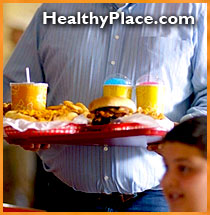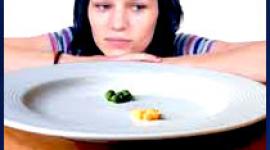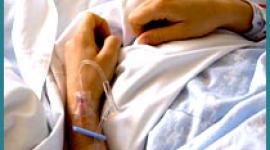Compulsive Overeating: Dealing With The Feelings and How To Treat It

What is it like to have anorexia or bulimia and be inside an eating disorders treatment center? Who needs to go to one? How much does it cost? Read this.
Dr. Deborah Gross , our guest speaker, is a board-certified psychiatrist and also the president of a company that helps people with compulsive overeating (emotional overeating, binge eating).
David is the HealthyPlace.com moderator.
The people in blue are audience members.
BEGINNING:
David: Good evening everyone. I'm David Roberts. I'm the moderator for tonight's conference. I want to welcome everyone to HealthyPlace.com. I hope your day has gone well. Our conference tonight is on "Compulsive Overeating: Dealing with the Feelings and How to Treat It". Our guest is Dr. Deborah Gross. Dr. Gross is a board-certified psychiatrist in private practice. She is also the president and co-founder of Sea Star, a company that produces programs to help people deal with compulsive overeating (emotional overeating, binge eating).
Good evening, Dr. Gross and welcome to HealthyPlace.com. We appreciate you being here tonight. Can you give us your definition of what "overeating" is?
Dr Gross: Overeating is eating more than you meant to, or more than what is healthy for you. Compulsive overeating is a different thing. A compulsion is anything we feel driven to do in spite of knowing that it is harmful
David: What causes someone to compulsively overeat? Is it brain chemically oriented or is it more of a psychological thing?
Dr Gross: The head bone is connected to the rest of the body, therefore, usually both elements are involved. Compulsive overeating, in one sense is an addiction, like alcoholism or drug addiction. It's not a weakness or a moral issue.
David: So, are you saying that some people have a propensity to compulsively overeat?
Dr Gross: Yes. Newer research is showing that the rate of compulsive overeating is much higher with blood relatives who have other compulsive or addictive disorders.
David: With many addictions, like drugs or alcohol, the addict finds it almost impossible to help himself stop using the substance and therefore self-help is really ineffective. Does that hold true for compulsive overeating?
Dr Gross: Good questions. Relapse happens in all compulsive disorders and it is important to have help, like a coach or a whole team of helpers. Many of the same tools used in AA, for example, can be used to help yourself with compulsive overeating. (Overeaters Anonymous)
David: What about the emotional tie-in to compulsive overeating? I'd like you to address that, and then we'll have some questions from the audience.
Dr Gross: Feelings influence food behavior. It starts in the cradle. Baby gets hungry, baby cries, mama feeds and cuddles, so the connections is really strong. You must learn to emotionally nourish yourself well in all ways, because not all hunger is for food. Ask yourself "is it my stomach that is hungry or my heart"?
David: How would you suggest one do that-- nourish yourself in other ways?
Dr Gross: The first thing you have to do is, learn what your triggers are for emotional overeating. For example, if you are extremely stressed out at the end of the day, before you go to the fridge and eat everything in there, try doing things that are relaxing for you, like take a walk, a bath, call a friend. I tell my patients to move the body, feed the mind and lavishly indulge the sprit.
David: Here are some audience questions:
DrkEyes2 A: What is behind the addiction to compulsively overeat?
Dr Gross: All of the research indicates that the biological part of the problem lives in a place in the brain called the mesolimbic system. This place is very deep inside our brain, and it's very primitive, so it doesn't listen to reason. There are also some brain chemicals, like serotonin, which maybe involved, although there is a lot we don't know. Depressive disorders and anxiety disorders are problems for some people as well.
mazey: I want to get control over my food intake but it saddens me as I continue to eat foods that make me real sick. I have the intellect but my emotions take control. Having Borderline Personality Disorder, will I ever be able to get a grip?
Dr Gross: Where there is breath there is hope. Most people with Borderline Personality Disorder, have had lots of losses, and so it is tempting to try to fill the empty place with food. Working on making your relationships more healthy will probably be very key to you.
David: Is there any medication out there that can help block the "feeling of wanting to eat" or is it all on the emotional level?
Dr Gross: Numerous medications have been studied for this purpose. Meridia has helped some people.
kateviennaoh: I have been fighting my overeating and bingeing for most of my life, with only temporary success. At this point, I can't see any way of being successful long term. I don't see or feel any hope. I don't know what to do except give up and eat. Thanks, Kate
Dr Gross: Don't give up. You're worth more than that. A person worth is not measured in pounds. I have a chapter in my upcoming book about this and I call it "Priced by the Pound". Society does that to you, but don't do it to yourself, please.
|
|
David: And I think Kate brings up a great point here, doctor. Right now, society frowns on people being overweight. Some people are downright rude about it. How, as a compulsive overeater, can you deal with that emotionally, and not let your self-esteem hit rock bottom?
Dr Gross: Here's what I tell my patient's my motto is: "Always remember that it is perfectly possible to be perfectly wonderful without being anywhere near perfect".
David: I want to address one thing about Meridia, there are some questions as to its safety. Are you still recommending that to your patients?
Dr Gross: It depends on the specific situation. Medically and psychologically, no medications should be used without careful discussion with your doctor of the risks and side-effects, versus the potential benefits.
David: One other question I wanted to ask, since you compared compulsive overeating with an addiction. With an addiction, the doctors say you are never really "cured," you just manage it better. Is that the same with compulsive overeating?
Dr Gross: Absolutely! That is an important though unpleasant reality. The difference between alcoholism and compulsive overeating is that while the alcoholic can stay out of bars, the compulsive overeater can never get away from food. I think that accounts for a lot of the relapse problems.
kateviennaoh: Are there programs like detox for compulsive overeating? If so, what, and where are they?
Dr Gross: I consider all highly structured diet programs to be similar to a detox. The research shows that sometimes it is helpful for people to take a break from making decisions about food, that is why many commercial diet programs have highly structured eating plans at the beginning, and allow more choices as time goes on.
jat: I'm tired of trying different medications. I was on Paxil for awhile. Then it wasn't working anymore. As I tried to taper off, I experienced withdrawal. I've tried Prozac, and they didn't work. I tried Zyprexa, Effexor and had bad reactions. How can I be expected to even be willing to try another drug? And then, there's the insomnia I experience. When I do take a medication, I then need something else to help me sleep. Presently, I'm just taking St. Johns Wort and that isn't working at all. Where should I go from here? Or do I even bother with medications anymore?
Dr Gross: I can't give medical advice of that kind in this format, but I know it is frustrating to try and try, and have so many problems. I assume you are trying these medications for depression. Nowadays people have so many options that sometimes it's important to be sure that the psychological factors are being addressed. The research shows that a combo of medications and psychotherapy is best for complicated situations.
David: I'd like some feedback from the audience. Maybe you could share some of the emotional issues you are dealing with as a result of compulsive overeating. A lot of times, people feel they are the only ones who feel this way and by sharing this you might be helping someone else here tonight.
Dr. Gross, you have a program to help compulsive overeaters. Can you describe it and tell us a little more about it? And how effective is it?
Dr Gross: My program is called "The food and feelings system for weight loss wellness". It can be an additive to any program for the diet math "the calories and exercise part". It starts with having your food and feelings profile done. This self-test identifies the 12 food and feeling or compulsive overeating issues that I've found to be most important. Then you get a teaching module for each one of these.
David: Here are some audience responses regarding emotional issues:
jat: I am dealing with overeating and Obsessive Compulsive Disorder. I was doing so well with food, then I had a hysterectomy about 2 years ago and have gained so much weight. Now body image is a major issue as well as depression.
mazey: I have fatty liver disease. My trigs. were over 1400. My liver stuck out of my stomach even when I was at my heaviest. Real sad. I have a lot of self-hatred and embarrassment. I try to not eat in front of people because I'm fat, and when I eat at home I hate myself.
susie: When I am deep in depression, I feed the need for more and more food, even though I know that I have just eaten.
caglel: At times, my desire to eat is greater than my desire to lose weight. Do you have any tips on motivation?
Dr Gross: I define motivation as "you, plus all available help". Think hard about what has worked for you in the past and what has not. Having a trainer or a doctor or a nutritionist to give you professional help is a big advantage. But motivation is mostly all about You. Write down your goals, and why you want to lose weight, and read it everyday. It has to be for You.
David: Here's another audience response:
kateviennaoh: I'm doing the therapy etc., but when I'm alone I want to eat. I know what I need to do, but I don't!
DrkEyes2 A: So what is the NEED that is served by overeating?
Dr Gross: There is a reflex between your stomach and your brain. Think about puppies you have known. When you feed the puppy until it's belly is stuffed, it goes to sleep. Food is a very effective tranquilizer. Momma nature wanted us to survive, so she made us with a very strong connection to food.
|
|
zeesant: I have tried many so called diets in my time, however, in time, different issues come up in my life that stop me in my tracks. Do you know of anything available that would help me know what my issues are concerning how my feelings control my diet?
Dr Gross: The food and feelings profile I mentioned, was designed to do that, to help you figure out what your triggers are for overeating. Ask yourself this question: what sends me to the fridge? If the answer isn't food or hunger, then you could eat everything in your house and still not feel any better.
hpcharles: The speed with which I substituted food stuff for cigarettes was incredible. Five months and 35 pounds later, and no sense of guilt - only justification...now what!!??
Dr Gross: That's a common problem. I'm glad you don't feel guilty, because feeling guilty makes people want to overeat more. Create a tool box of other things you can do besides overeating, surround yourself with little things you love, reward yourself with non-food items, figure out what builds you up and nourishes you emotionally. Also be sure that you know how to say the "N" word....NO.
David: If food is your "comforter" and helps you through the emotional issues, what do you replace it with?
Dr Gross: That depends on what the emotional issues are. If you have self-esteem problems you must learn to think more positively about yourself. Most of us are much better at doing this for other people, than we are for ourselves. I tell people to work on being a good momma to themselves.
David: One final question, do the antidepressants, like Paxil, Wellbutrin, Prozac, help with controlling compulsive overeating?
Dr Gross: Sometimes, but also these medications are associated with weight in long use.
David: I know it's getting late. I appreciate you coming tonight Dr. Gross, and sharing your knowledge with us. I also want to thank everyone in the audience for coming and participating. I hope you found it helpful. Good night everyone.
Dr Gross: Thank you very much for inviting me.
Disclaimer: We are not recommending or endorsing any of the suggestions of our guest. In fact, we strongly encourage you to talk over any therapies, remedies or suggestions with your doctor BEFORE you implement them or make any changes in your treatment.
|
|
APA Reference
Tracy, N.
(2007, February 26). Compulsive Overeating: Dealing With The Feelings and How To Treat It, HealthyPlace. Retrieved
on 2026, March 4 from https://www.healthyplace.com/eating-disorders/transcripts/compulsive-overeating-dealing-with-the-feelings-and-how-to-treat-it



